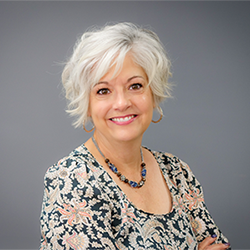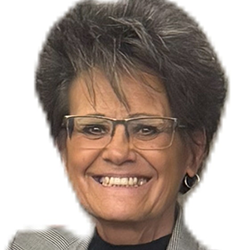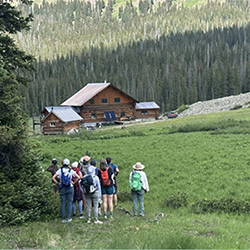Strong Links, Strong Communities:
Celebrating Colorado’s Regional Health Connectors
In Honor of the Regional Health Connector Program’s 10th Anniversary
This year marks ten years since Colorado’s Regional Health Connector (RHC) program began strengthening clinic–community ties to improve public health systems. What started in 2015 with just two RHCs serving the Denver area has since grown into a statewide initiative that supports the health and well-being of communities across Colorado. Learn more below about the journey the program has taken and how RHCs impacted their communities, in their own words.
In Region 14, we teamed up with health care providers to promote secure gun storage. In just 3 months, nearly 200 gun locks were distributed during well-child visits. Providers were trained to talk with families about safety, building trust and creating space for open conversations. Since then, over 500 cable locks and 400 handgun safes have been given out—and the work continues!
Laying the Groundwork for Growth
In 2015, Trailhead Institute and the Colorado Health Institute formed the RHC program with funding through the Colorado State Innovation Model (SIM) initiative and the EvidenceNOW Southwest (ENSW) project. The program began with two RHCs serving the Denver metro region and soon reached full force in 2017, hosting RHCs in each of Colorado's 21 Health Statistics Regions.

The 21 Colorado Health Statistics Regions are aggregations of counties developed by the Colorado Department of Public Health and Environment’s Health Statistics Program in partnership with state and local public health professionals.
One clear impact I made on Jefferson County was improving support for older adults. As the RHC, I developed and shared an Older Adult Resources list, partnered with the state to address suicide issues for older adults, and brought COVID vaccines to homebound individuals. I shared information and facilitated connections on topics for older adults like the benefits of connectedness, emergency preparedness, heat-illness prevention, fraud/scam awareness, and mental well-being. By linking people to practical tools, trusted information, and new community connections, my efforts helped older adults in Jefferson County stay safer, healthier, and more engaged—making aging in the community stronger and more supported.
One significant change I’ve observed in my community through my work as a Regional Health Coordinator (RHC) is the enhanced accessibility and quality of healthcare services available to our residents. My primary focus has been on improving healthcare access in rural and frontier communities by offering free to low-cost preventive services and resources. On August 10, 2024, I collaborated with the Colorado Area Health Education Center and Centennial Area Health Education Center to provide complimentary health screenings and resources, effectively broadening access to essential care. Additionally, on June 14, 2025, the Sun Bus was present at the Celebration of Summer in Burlington, where we offered free skin cancer screenings. These initiatives have not only increased healthcare access but have also significantly contributed to improving early detection outcomes, all at no cost to community members.
Catalyzing Local Impact
RHCs are a community-rooted workforce who forge powerful connections between primary care, public health, social services, and local organizations, including food banks, behavioral health providers, and housing agencies. Because they live and work in their regions, RHCs are uniquely positioned to understand local assets and challenges and serve as trusted conveners rather than direct service providers.
The RHC program has facilitated connections among people whose hearts are hurting. Grief-support-program participants have shared that they’re now able to see the universal experience of grief and feel deeply held in those hard emotions. They have new space and communal accompaniment for grief that was buried and wanting to rise and be held. Their grief feels validated. The lasting impact is a deeper appreciation and understanding of the grieving process through stories shared, the sheer wonder of friendships formed, and a sense of heartfelt fresh resolve, recognizing that sorrow and joy are the warp and weft of life well-lived.
Our RHC has significantly improved access and collaboration by creating regional resource lists and sharing bimonthly offerings on trainings, funding, and events. These are now promoted by statewide foundations, expanding their reach. Most impactfully, the RHC has laid the groundwork for a regional grief and loss support network—connecting individuals to services, training providers, and building community awareness around grief as a public health issue.
Facing the Pandemic
As the impacts of COVID-19 increased across the state in early 2020, RHCs were already embedded community leaders. They pivoted swiftly as systems redirected resources to emergency response and new and existing community needs deepened. They coordinated testing efforts, shared resources, facilitated PPE distribution, helped with contact tracing, and supported vaccine access. Their agility and relational power amplified community response while maintaining vital cross-sector connections.
Over six years ago I heard about a program called Strengthening Families Program: For Parents and Youth 10-14 (SFP 10-14), an evidence based program shown to help youth make good decisions, and helps build stronger families, safer communities, and schools that are better places to learn. I reached out to the Program Director at CSU to discuss bringing it to the San Luis Valley. He agreed if I would oversee the project in the Valley. We began with a facilitator training class in which nine others, and I took the 3-day certification course. Covid hit so we pivoted and piloted virtual classes. Our group was one of two that tested this method and in turn, shared with others across the US our lessons learned. After COVID, I became a Certified Train the Trainer for CSU, and we resumed in-person trainings. Since this time, the San Luis Valley has supported five SFP 10-14 Facilitator trainings and now has 36 certified facilitators. Over the past six years, more than 16 SFP 10-14 sessions have taken place across five of the six counties in the San Luis Valley, reaching over 250 youth, parents, or caregivers.
Building Behavioral Health Resilience
In response to the COVID-19 pandemic's impact on mental health and substance use, Colorado passed the Behavioral Health Recovery Act (SB21-137) in 2021. The bill created a recovery support services grant program using funding from the federal American Rescue Plan Act (ARPA) to expand behavioral health services, particularly in rural areas and for vulnerable populations. Continuing their pandemic response, the RHC program received $1 million in funding from SB21-137 and turned their focus toward behavioral health.
Supported by local host organizations, each RHC conducted a needs assessment in their region and identified gaps in mental health services, particularly among historically underserved groups. Based on this data, the RHCs proposed projects intended to address these priority gaps and improve health equity using local knowledge, services, and assets. From interventions to prevention strategies, nearly all resulting projects continued beyond their initial funding, with many catalyzing new funding totaling over $850,000. These projects addressed needs across rural and frontier areas, Medicaid populations, Veterans, refugees, youth, LGBTQ+ individuals, and more.
Annie and Kirsten, Chaffee County and R13’s two RHCs who are also our Behavioral Health Navigators/Coordinators through a blending and braiding of funding, have made significant strides in supporting the behavioral health landscape in our rural and remote region of Colorado by starting our first ever behavioral health coalition which has already figured out solutions to some of our more pressing behavioral health challenges. They have thoughtfully facilitated and orchestrated meetings, ensured robust participation, and continue to excel in motivating members to roll up their sleeves to get work done. In addition, they are working on a mental health education curriculum that is similar to something like Mental Health First Aid but is shorter and more tailored to our local community. This is no easy feat, but if done successfully, we hope to share it with the other local public health agencies in our region. On a regular basis, Kirsten and Annie meet with people in our community who experience some of the most barriers to accessing our traditional healthcare system, including behavioral health. They provide them the navigation they need to understand what resources and supports are available to them and how to connect to them. Every day, Annie and Kirsten are making a difference in the lives of providers and members of the public by being a consistent and knowledgeable resource for our community.
New Horizons
In 2023, Governor Polis signed the Regional Health Connector Program into law, awarding the program $1.5 million in part-time funding. Through HB 23-1244, the RHC program transitioned to the purview of the Colorado Department of Public Health and Environment’s Prevention Services Division to further the program’s sustainability and growth.
“Emily [RHC in Region 11] has fostered a strong sense of connection within our community by organizing regular gatherings that bring together frontline non-profit and behavioral health professionals. Through active listening and engagement, Emily has gained a deep understanding of the needs of these professionals, and in response, has built something truly meaningful and supportive. These events have created a valuable space for support, resource-sharing, and collaboration.”
“Emily Schweitzer, the RHC for Northwest Colorado plays a vital role in connecting people to the resources they need. Our taxed and tired providers, both medical and behavioral health have found her support refreshing and necessary. And the creation of the Yampa Valley Resources website is an incredibly valuable resource for providers, partners, and community members.”
Trailhead Institute, working with the Colorado Department of Public Health and Environment and the University of Colorado, continues to strengthen partnerships and promote RHC program alignment with state and local programs, partners, and public health priorities. As the program continues to evolve, RHCs, host organizations, and funders are currently developing a five-year strategic plan to advance this essential workforce that connects the systems that keep us healthy.
As we look forward to new horizons, we celebrate the flourishing that RHCs foster in their communities. Here’s to ten years, and many more to come.








